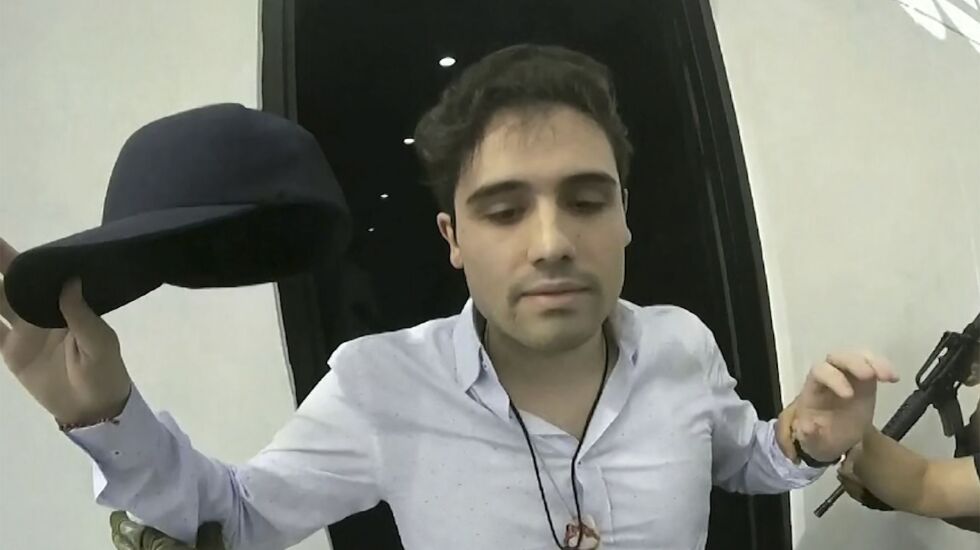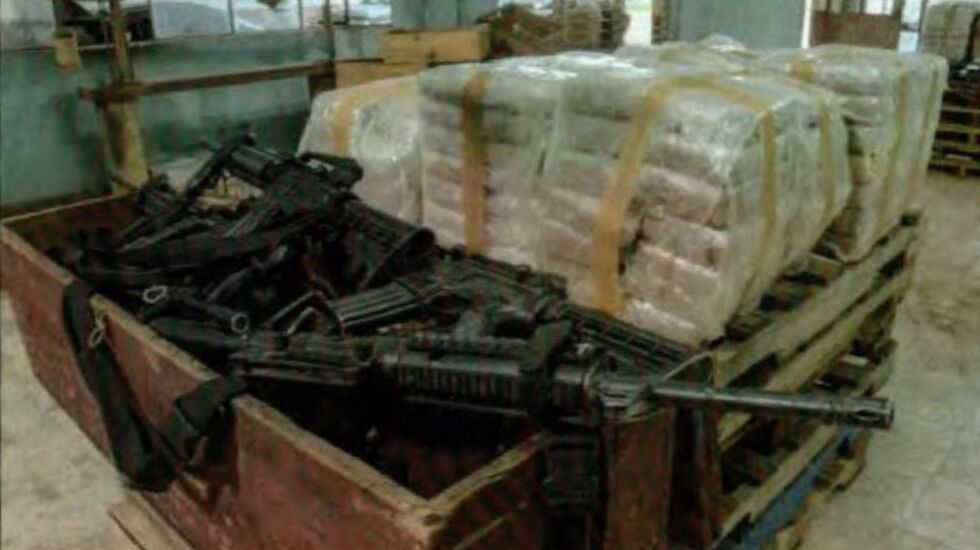
A son of drug kingpin Joaquin “El Chapo” Guzman Loera has been extradited to Chicago five months after the feds unveiled sweeping charges against four of the Sinaloa cartel leader’s children, accusing the so-called “Chapitos” of running their dad’s deadly cartel through brutal violence.
Ovidio Guzman Lopez was flown from Mexico and arrived Friday in Chicago, according to a law enforcement source.
He was among four El Chapo sons charged as part of a wider Justice Department campaign against what Attorney General Merrick Garland at the time called “the largest, most violent and most prolific fentanyl-trafficking operation in the world — run by the Sinaloa Cartel and fueled by Chinese precursor chemical and pharmaceutical companies.”
Also charged in Chicago: Ivan Archivaldo Guzman Salazar, Jesus Alfredo Guzman Salazar, and Joaquin Guzman Lopez.
Ovidio Guzman Lopez is the first to arrive in Chicago, landing at O’Hare Airport Friday afternoon.
Though their father also faced federal drug charges here, he was ultimately prosecuted in federal court in Brooklyn. El Chapo, convicted in 2019, is serving a life sentence.
But now, his son likely will be arraigned at the Dirksen Federal Courthouse in Chicago’s Loop. Though it’s unclear exactly when that will occur, it is certain to unfold amid significant security.
“I think it shows that DOJ, looking back, realized Chicago was a better seat for the Chapo trial even though it all turned out fine,” said Jack Riley, former head of the U.S. Drug Enforcement Administration office in Chicago and later the No. 2 official in the agency.
“They politically shortchanged us and I do believe some people in the department said, ‘Let Chicago have something’ because a lot of that evidence they are going to use against this kid was developed in the earlier cases.”
The four sons were accused in April by Justice Department officials of torturing their enemies by electrocuting them, waterboarding them and feeding them alive to tigers. Authorities said Ivan Archivaldo Guzman Salazar and Jesus Guzman Salazar kept the animals on ranches as pets.
Despite the precarious relationship between the United States and Mexico, Riley said he thinks Mexico extradited Ovidio Guzman because of the international uproar caused by their father, El Chapo, who repeatedly escaped from prison in Mexico.
“Remember when we named him Public Enemy No 1,” Riley said of El Chapo. “That ticked off legitimate Mexican-based businesses who had dealings in the U.S. and they began putting pressure on the Mexican government because it was an embarrassment. I think that has a lot to do with this one.”
“We figured if we got [El Chapo] out of Mexico, those kids would show their colors,” Riley said. “They were on social media with the Ferraris and tigers. We called them the goofy narco juniors.”
Because of the Chapitos’ Sinaloa cartel and other trafficking groups in Mexico, U.S. officials say, fentanyl-related deaths in Chicago and elsewhere in the country have risen to alarming levels, prompting the DEA and other federal and local law enforcement agencies to boost their efforts to cut off the supply in Mexico.
Fentanyl — 50 times more potent than heroin — is the leading cause of death for Americans 18 to 49, authorities say.
Anne Milgram, the DEA’s administrator, said in April that the men took their father’s cartel and made it “more ruthless, more violent, more deadly. And they used it to spread a new poison: fentanyl.”

An indictment in Chicago tied the Chapitos to at least four killings. It said the brothers were involved in the Battle of Culiacan in the Sinaloa Cartel’s stronghold in Mexico where, on Oct. 17, 2019, about 700 armed cartel members attacked government and military targets, thwarting the capture of Ovidio Guzman Lopez. At least 13 people died.
That indictment also said the Chapitos shipped drugs from countries in Central America and South America to Mexico using aircraft, submarines, boats and other carriers, then smuggled them into the United States using vehicles, rail cars and tunnels.
The Chicago case alleges they sold and distributed cocaine, heroin, methamphetamine and marijuana throughout the Chicago area. Several indictments in New York also accused the brothers of being fentanyl traffickers.
The Chicago indictment also accuses the Chapitos of murder, kidnapping and assault against law enforcement, rivals and members of their own cartel. In 2017, for instance, they kidnapped two Mexican federal police officers, fatally shooting one and torturing the other before killing that officer, too. The torture involved ripping the officer’s muscles from his arm and stuffing chili peppers into the wounds and his nose, authorities say.
Garland issued a statement Friday calling the extradition “the most recent step in the Justice Department’s effort to attack every aspect of the cartel’s operations. ... The Justice Department will continue to hold accountable those responsible for fueling the opioid epidemic that has devastated too many communities across the country.”







